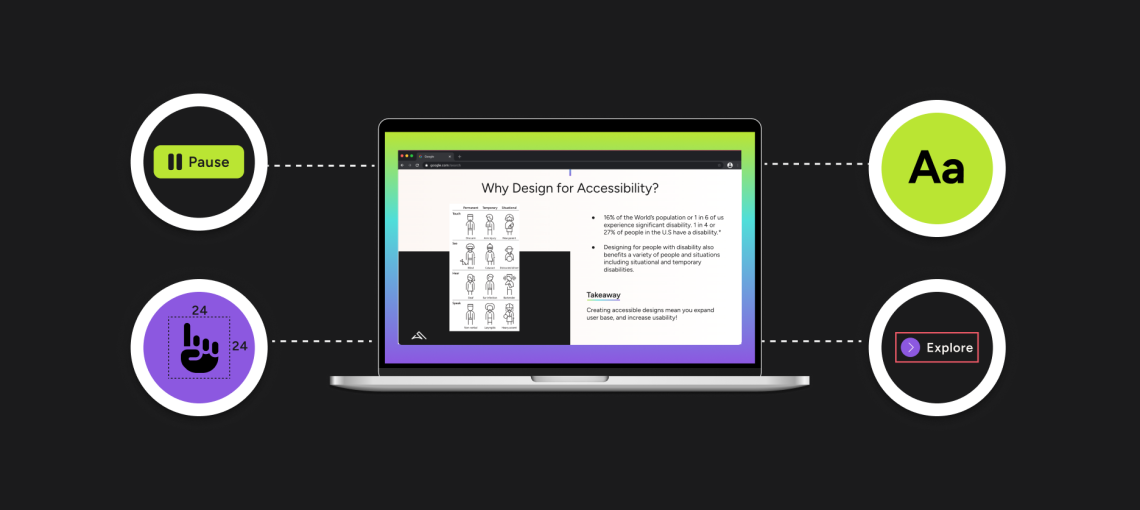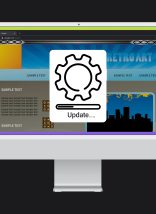We’ve all heard the saying that “content is king” when it comes to the web. But what if you’re a sight-impaired person trying to access your favorite website? In a perfect world, your screen would read out all of the text on the page and give you the option to click on links. That’s where website accessibility works: to ensure that everyone has access to the same information and tools, regardless of disability or other factors.
Most of us already know that there are rules for physical premises when it comes to accessibility for people with disabilities, either physical or socio-economic. Fewer know that accessibility can apply to online content, as well.
The Americans with Disabilities Act (ADA) mandates something called WCAG (Web Content Accessibility Guidelines) compliance, which is a means of designing websites, tools, and technologies so that people with disabilities can use them as easily as possible. WCAG compliance covers several types of disabilities, including blindness and low vision, deafness and hearing loss, limited movement, speech disabilities, neurological limitations such as Parkinson’s disease or Alzheimer’s, and cognitive limitations such as learning disabilities.
The goal of ADA compliance is the creation of a website that uses a variety of different design and web development practices to assist people with disabilities in successfully navigating the site.
Who Needs to Have an Accessible Website?
The ADA requires state and local governments to be accessible under Title I and any business that is open to the public under Title III.
State and local government websites, as well as any private business that receives federal funding receive the most scrutiny for accessibility. An inaccessible website can bar users with disabilities from the government entity’s services, events, and activities.
Websites are increasingly becoming accepted as public spaces and public spaces are required to be accessible in order to be ADA compliant. The Department of Justice has historically interpreted that ADA compliance applies to all “goods, services, privileges, or activities offered by public accommodations, including those offered on the web.” Public websites may include those for:
- Retail
- Restaurants
- Hotels, Inns, and Motels
- Hospitals and Medical Offices
- Banks
- Theaters and Sports Arenas
What are the Benefits of Accessibility?
There are numerous benefits to making your website ADA compliant. In terms of customer retention, it’s a good idea to design web content to be as accessible to as many people as possible. Users with disabilities are a highly under-served segment, so ADA compliance can help your organization differentiate itself from competitors. Accessible sites and apps allow more people to engage with your organization, buy your products, or access your services.
Some other ways that Accessibility benefits your organization include:
- Reduced risk of legal complications
- Improved user experience for everyone
- Improved website Search Engine Optimization (SEO)
Simply put, managing your accessibility is part of building a modern, robust digital platform.
How Do We Know We’re Compliant?
Companies seeking ADA compliance often undergo a website accessibility audit that includes both automated and manual testing to ensure compliance. The audits help companies identify problems and put them on the path to improving their practices, reaching a broader audience, and avoiding discrimination or legal complications.
What is the Process for ADA-Accessibility Audits?
The process is quite straightforward. Once you identify a company that performs accessibility testing, you provide your contact information with the website you’d like the company to review. In particular, you will want your homepage, service/product pages, contact page, and other key landing pages reviewed. Once the report is completed, the company will follow up with a call to discuss their initial findings and share their detailed accessibility audit report with recommendations.
If problems are suspected, the audit company will set up automated testing to catch code issues that make your site inaccessible. The experts may recommend that you update old, inaccessible document repositories to be compliant with modern standards, and can help you develop your accessibility remediation strategy and work with a trusted partner to ensure your site stays up to date.
Consult a Professional Web Design and Development Company
Atlantic BT is an award-winning technology firm located in Raleigh, NC. We offer enterprise web design, website accessibility testing, IT consulting, software development, cybersecurity, and cloud technology to help clients easily manage, secure, and scale their core technologies. We combine full-service digital marketing with custom software development and technology solutions. Our awards stem from outstanding results in all aspects of digital, from UX design to modernizing applications. For more information, contact us or call us at 919-518-0670.







